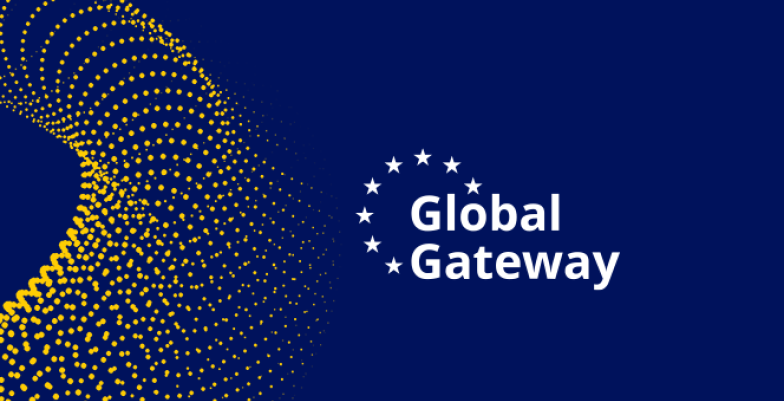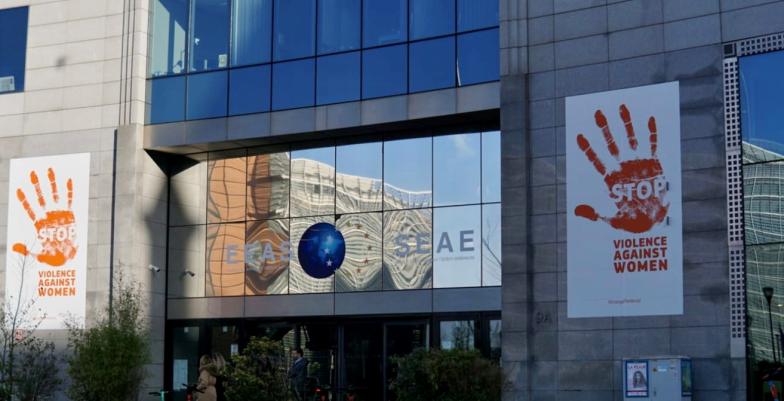EU Projects with Cabo Verde
Useful information about projects between EU and Cabo Verde.
Projects with civil society
CITRES MAIO: The Integrated Solid Waste Collection and Treatment Center on Maio Island supports sustainable productive activities by protecting water resources and fragile ecosystems through effective waste management, including collection, treatment, recycling, and environmental awareness.
Praia+ Inclusiva: This project strengthens urban governance and promotes the social, environmental, and economic sustainability of Praia.
Maio 2025 Programme: A sustainable and cohesive development initiative for Maio Island, focused on integrating tourism with strategic sectors such as agriculture, fisheries, the blue economy, environmental preservation, culture, health, entrepreneurship, and the circular economy—promoting balanced growth and the well-being of local communities.
Direct support to civil society organizations and partners strengthens the European Union’s commitment to sustainable development in Cape Verde and recognizes the important role civil society plays in this area.
Currently, three projects on sustainable tourism are underway in protected areas on the islands of Santo Antão, São Nicolau, and Fogo. These projects support and empower civil society as promoters of sustainable tourism in protected areas, generating income for local communities while contributing to environmental sustainability and improving socio-economic conditions.
TERRAS VIVAS: Sustainable tourism focused on the natural, agricultural, and community heritage of Santo Antão. The project promotes sustainable management of natural resources and the well-being of rural communities in protected and buffer zones by preserving agro-ecosystems, encouraging participatory management, and enhancing tourism, creating opportunities for social inclusion, income generation, and food security.
ECORAIZES: Strengthening ecotourism, participation, and income for communities in protected areas of Santo Antão and São Nicolau. This project aims to consolidate sustainable and inclusive tourism in these protected areas.
Destino Fogo: Ecological and sustainable development of tourism and innovation in offerings. This project seeks to enhance the role of civil society organizations and local communities on Fogo Island in the joint planning, management, protection, and promotion of sustainable tourism in protected areas.
Djunta Mon – Prevention of Sexual Abuse of Children and Adolescents and Support for Victims
This project aims to prevent sexual abuse of children and adolescents and raise awareness about creating safe environments for children. It promotes collaboration between the government, civil society, and the EU to strengthen child protection policies and ensure victims receive the necessary support for recovery.
Participants in the implementation of Djunta Mon include SOS Children’s Villages, the Cape Verdean Institute for Children and Adolescents, ACRIDES, the Cape Verdean Institute for Gender Equality and Equity, the Cape Verdean Association of Women Jurists, VERDEFAM, the Municipal Councils of Praia, Santa Catarina, and São Filipe, and Cape Verde Radio and Television.
Blue Economy and regional programmes
WASOP: West Africa Sustainable Ocean Programme
This program promotes the sustainable integrated use and management of marine and coastal resources, aligned with the blue economy concept and the Global Gateway’s goal of protecting and sustainably using natural resources, using nature-based solutions as a foundation for green recovery. These objectives relate to commitments made by the EU at the 'One Ocean Summit' (Brest, February 2022), 'UN Ocean Conference' (Lisbon, June 2022), and 'Our Ocean Conference' (Panama, March 2023).
More information on WASOP: https://international-partnerships.ec.europa.eu/policies/programming/programmes/west-africa-sustainable-ocean-programme-wasop_en
Regional Economic Governance Programme PALOP-TL – Strengthening Public Finance Management and Budget Oversight (Pro PALOP-TL Phase III)
The Pro PALOP-TL ISC programs have developed innovative tools and a Community of Practice involving over 20 public institutions and civil society organizations across the six PALOP-TL countries (Angola, Cape Verde, Guinea-Bissau, Mozambique, São Tomé and Príncipe, and Timor-Leste). They focused on promoting transparent, efficient, and gender-sensitive public finance management through south-south/triangular cooperation and peer partnerships.
The third phase (2023-2026) aims to consolidate progress by expanding institutional and civic capacities to monitor budgets, develop digital public finance management systems, mobilize domestic resources, and promote gender-equal economies. It will also advance tools such as the Community of Practice, the Digital Budget Transparency Platform, and gender-sensitive budgeting models, aligning with the EU’s ecological and digital transitions and extending best practices to other countries supported by EU budget aid.
Security and Migration
.
SECURITY PROJECTS IN CABO VERDE
Security and Stability is an integral part of the Special Partnership Cabo Verde EU since it conclusion in 2007. The geostrategic location of Cabo Verde, but also its exposure to international threats and illicit traffics is widely recognised ,and is at the base of a dense network of agreements and arrangements concluded by the country with international partners (USA, Brazil, China..), including several EU MSs (PT, ES, FR, Lux) on security issues. As an archipelagic country, where jurisdictional waters amount for over 98% of the whole territory, maritime security is one of the main priorities.
ONGOING SECURITY PROJECTS
-
UNDER THE GLOBAL ILLICIT FLOWS PROGRAMME (GIFP)
The GIFP of the European Union was launched in 2019 as a successor to the former Cocaine Route and Heroin Route programmes, to adapt EU programming and responses to the developing criminal landscape globally. Cabo Verde has received quite consistent support in terms of capacity building on drugs and other illicit traffics. The programme provides support to law enforcement and judicial authorities in partner countries by promoting regional and trans regional cooperation, information sharing, capacity building and by providing tools and research to counter organised crime. AIRCOP, COLIBRI, CRIMJUST, ENACT, and SEACOP are all implemented in Cabo Verde.
AIRCOP VI - The Airport Communication Project
Duration: Since 2010, it is the longest running GIFP project, currently in phase VI until May 2026
Funded by: EU Service for Foreign Policy Instruments (FPI)
Managed by: UNODC in partnership with INTERPOL and the World Customs Organization (WCO)
Implementing agency: UNODC
The Airport Communication Project (AIRCOP) enhances the capacity of international airports to detect and intercept high-risk passengers, cargo, and mail. AIRCOP established a Joint Airport Interdiction Task Force (JAITF) at Praia International Airport, improving inter-agency cooperation among national law enforcement bodies. The project contributes to combating illicit drugs, other illicit commodities, terrorism-related threats, trafficking in persons, and migrant smuggling, and enables secure real-time information sharing at national, regional, and international levels.
COLIBRI II Phase – Monitoring and Controlling General Aviation
Duration: Since 2019 (ongoing). Currently in its second Phase (April 2023-2026)
Funded by: EU Service for Foreign Policy Instruments (FPI)
Implemented by: WCO - World Customs Organization and Spain’s Civil Guard
The COLIBRI project strengthens national capacities to prevent illicit trafficking via general aviation through training, technical assistance, and surveillance tools. A key component is the Geoportal platform, which enables real-time data sharing among national and international agencies. Cabo Verde was initially identified by ENACT as a major entry point during Colibri's first phase, which began in 2019. Its ties to Portugal and Brazil via its shared language as well as its multiple islands with their own aerodromes and substantial tourism sector make it particularly susceptible to transnational organized crime. Therefore, COLIBRI conducted its scoping mission to Cabo Verde in February 2020. Since then, Cabo Verde has participated in and received training from COLIBRI. Even though they have yet to sign a Memorandum of Cooperation, negotiations are still ongoing. However, Cabo Verde does not have a national steering mechanism in place and has adopted terms of reference. In 2023, COLIBRI conducted an in-person training on monitoring and controlling general aviation in Cabo Verde. Then, in 2024, COLIBRI coordinated a monitoring mission to Cabo Verde in February. Cabo Verde notably contributed to Operation COLIBRI Paramuno in 2025, resulting in major regional seizures and enhanced controls.
CRIMJUST – Disrupting Criminal Network operating along illicit Trafficking Routes
Duration: Since 2016, currently under Phase III until end of 2025
Funded by: EU Service for Foreign Policy Instruments (FPI)
Implemented by: UNODC in partnership with INTERPOL and Transparency International
The CRIMJUST project has been active in Cabo Verde since 2016, supporting the legal review of national frameworks to combat illicit trafficking and counter corruption. It aims to strengthen criminal investigation and justice cooperation along drug trafficking routes, with a focus on the cocaine trade, in several countries in LAC and Africa. CRIMJUST continues to assist Cabo Verde in reinforcing its criminal justice system. A major milestone was the establishment of a Joint Investigation Team (JIT) between Cabo Verde and Brazil in July 2022. The latest activity implemented by CRIMJUST in Cabo Verde was a regional workshop on asset recovery and management, which took place in April 2024.
ENACT - Enhancing Africa's Response to Transnational Organized Crime
Duration: Since 2016 (currently in Phase III, running until 2026)
Funded by: EU Service for Foreign Policy Instruments (FPI)
Implemented by: Institute for Security Studies (South Africa), INTERPOL, and the Global Initiative Against Transnational Organized Crime (GI-TOC)
Beneficiaries: Africa (continent-wide scope, including Cabo Verde)
The ENACT project aims to reduce the impact of transnational organized crime on development, governance, security, and the rule of law across Africa. It produces evidence-based research and analysis to inform policy, support dialogue, and build the technical capacity of African stakeholders to address organized crime. Since its launch, ENACT has published over 80 research papers, policy briefs, and analytical reports. Specific research related to Cabo Verde includes four articles published between 2019 and 2024. The initiative promotes informed policymaking and resilience to organized criminal threats.
Several regional projects (FRONTEX, WeCAPS, CRIMSOM II, ENACT, and others) have had very limited activity in CV during the last years.
SEACOP VI – Seaport Cooperation Project
Duration: November 2023- October 2026
Funded by: NDICI–Global Europe
Managed by: EU Service for Foreign Policy Instruments (FPI)
Budget: EUR 6 MEUR
Implementing agency: Expertise France and FIIAPP
Beneficiaries: Benin, Cabo Verde, Côte d’Ivoire, The Gambia, Ghana, Senegal, Sierra Leone, and Togo
SEACOP VI supports the fight against maritime illicit trafficking between Latin America, the Caribbean, and Africa. The project reinforces maritime security and counter-trafficking efforts across the Atlantic corridor. It focuses on capacity-building for Joint Maritime Control Units (JMCUs) and Maritime Intelligence Units (MIUs), enhancing information sharing and interregional cooperation. Previous SEACOP phases have established maritime units in key ports and delivered vessel control databases and essential equipment.
EnMAR – Enhanced MARitime Action in the Gulf of Guinea
Duration: October 2022 – October 2025
Funded by: EU Service for Foreign Policy Instruments (FPI)
Managed by: FPI Dakar and the EEAS Senior Coordinator for Maritime Security in the Gulf of Guinea
Budget: EUR 4.99 million
Implementing agency: Expertise France
Beneficiaries: Gulf of Guinea (19 countries)
The project provides support to public diplomacy linked to operations and events scheduled in the framework of the EU Coordinated Maritime Presences and the overall Gulf of Guinea Strategy. Its focus areas include political dialogue, coordination of EU-funded maritime security projects, capacity-building, public diplomacy, and visibility.
-
UNDER OTHER EU INSTRUMENTS AND MEANS
SAFE SEAS FOR AFRICA – Enhancing Maritime Security in Africa (Gulf of Guinea Component)
Duration: 2024-2028
Funded by: NDICI–Global Europe
Managed by: DG INTPA and the EU Delegation Abudja, 20 MEUR
Implementing agency: UNODC, IMO, and UNITAR
Beneficiaries: Gulf of Guinea (19 countries)
The project aims to strengthen the capabilities of national law enforcement agencies to investigate criminal acts at sea and support the establishment of legal finish mechanisms, while also enhancing regional cooperation and reinforcing the Yaoundé Architecture.
Coordinated Maritime Presences (CMP) initiative
Duration: Since early 2021 (ongoing)
Managed by: EU Senior Coordinator for Maritime Security
Implementing agency: EU Member States' naval and air forces under the CMP framework
Beneficiaries: 19 countries in the Gulf of Guinea
The Coordinated Maritime Presences (CMP) initiative enhances maritime security in the Gulf of Guinea by coordinating EU Member States’ naval and air assets in the region. It ensures coherence across EU and national actions and strengthens relations with regional partners. CMP supports maritime domain awareness, operational coordination, and strategic outreach while reinforcing the Yaoundé Architecture and maintaining a sustained EU maritime presence.
European Peace Facility (EPF)
EPF is an off-budget funding instrument established under the EU’s Common Foreign and Security Policy to support actions with military and defence implications. Through dedicated assistance measures, the EPF aims to strengthen the operational capacities of military forces in partner countries. As of early 2025, Cabo Verde is actively engaging with the EU to access EPF support, with discussions focusing on a potential assistance package of up to €12 million aimed at enhancing the country's military equipment and training capacities.
TAIEX - Technical Assistance and Information Exchange on Cybersecurity
Cabo Verde was the first sub-Saharan African country eligible for TAIEX support, particularly in the sensitive area of cybersecurity. TAIEX provides short-term, peer-to-peer technical assistance to help public administrations align with EU standards. In Cabo Verde, TAIEX has facilitated key initiatives including expert missions on electronic identification and digital signatures, enhancing the country's digital governance and cybersecurity infrastructure. TAIEX remains an active and flexible tool for Cabo Verde to access EU expertise across multiple governance sectors.
Two notable initiatives include: In May 2020, a mission focused on digital identity systems and e-passport development, engaging both EU and Cabo Verdean leadership. In January 2023, a strategic cybersecurity seminar organized alongside the EU–Cabo Verde Ministerial Meeting, featuring experts from DG CONNECT, ENISA, Portugal, and Estonia.
-
PREVIOUS EU SECURITY PROJECTS
Gulf of Guinea Inter-Regional Network II (GoGIN II)
Duration: May 2023 – April 2025
Funded by: EU Service for Foreign Policy Instruments (FPI)
Managed by: DG INTPA and the EU Delegation to Abuja
Budget: EUR 5 million
Implementing agency: Expertise France
Beneficiaries: 19 countries in the Gulf of Guinea — Angola, Benin, Cabo Verde, Cameroon, Democratic Republic of Congo, Republic of Congo, Côte d’Ivoire, Equatorial Guinea, Gabon, The Gambia, Ghana, Guinea, Guinea-Bissau, Liberia, Nigeria, São Tomé and Príncipe, Senegal, Sierra Leone, and Togo
GoGIN II builds on the achievements of the original GoGIN project (2016–2023), which supported the operationalisation of the YARIS maritime information-sharing and coordination platform. The initiative continues to reinforce regional maritime security cooperation, enhance participation of Coastal States in key exercises like OBANGAME and African NEMO, and improve the functionality and use of the YARIS platform in support of the Yaoundé Architecture.
Support to West Africa Integrated Maritime Security (SWAIMS)
Duration: May 2023 – June 2024
Funded by: European Development Fund (EDF)
Managed by: DG INTPA and the EU Delegation to Abuja
Budget: EUR 10 million
Implementing agency: Camões
Beneficiaries: 12 countries in West Africa — Benin, Cabo Verde, Côte d’Ivoire, The Gambia, Ghana, Guinea, Guinea-Bissau, Liberia, Nigeria, Senegal, Sierra Leone, and Togo
The Support to West Africa Integrated Maritime Security (SWAIMS) programme strengthened regional operational response capacities and rule-of-law-based governance at sea. Key activities included the delivery of 24 RHIBs and 24 forensic kits, alongside extensive capacity building. SWAIMS contributed to national enforcement capabilities and supported the Yaoundé Architecture by enhancing legal frameworks, providing equipment, and facilitating coordination structures such as the Multinational Maritime Coordination Centre (MMCC) in Praia, launched in January 2024.
iARMS (Illicit Arms Records and Tracing Management System) project supports the global fight against illicit firearms trafficking. Managed and implemented by INTERPOL, iARMS is a centralized database that facilitates the tracing of lost, stolen, trafficked, or smuggled firearms across borders. It enhances the ability of law enforcement agencies to identify trafficking routes and link cases involving firearms. Cabo Verde is among the countries connected to and benefiting from the system, strengthening its capacity to combat firearms-related crime and contributing to broader regional and international security efforts. Cabo Verde has already access to the iARMS database for lost, stolen, trafficked or smuggled firearms.
PESCAO - Improved Regional Fisheries Governance in Western Africa
Duration: 2018 – 2024
Funded by: European Union (European Development Fund)
Managed by: ECOWAS and DG INTPA
Budget: EUR 15 million
Implementing agency: European Fisheries Control Agency (EFCA), in collaboration with ECOWAS and regional fisheries bodies
Beneficiaries: 15 ECOWAS countries, including Cabo Verde
The PESCAO project aimed to improve regional fisheries governance in West Africa by strengthening the coordination of fisheries policies and combating illegal, unreported, and unregulated (IUU) fishing. In Cabo Verde, PESCAO supported the development of monitoring, control, and surveillance (MCS) capacities, fostered regional cooperation, and contributed to sustainable fisheries management. The project enhanced data sharing, reinforced legal and institutional frameworks, and promoted alignment with international standards in fisheries governance. It implemented an aerial surveillance of the CV EEZ in February in parallel to the Joint Committee of the SFA (Mindelo 9 and 10 February 2023).
GESTDOC Project – Modernization and reinforcement of the identification and document security chain in Cape Verde and Guinea-Bissau (2018-2023)
Duration: 48 months (original) | 67 months (after extension). End date: 05 July 2023 (original), Extended to 05 February 2025
Implemented by: Camões, I.P.
Budget: EUR 5 million EUR
Born as a trust fund project it has a budget of 5 million euros and several implementing partners in Portugal, Cape Verde and Guinea-Bissau. Its general objective the improvement of security levels documentation and migration management in Cape Verde and Guinea-Bissau, contributing to the respect for human rights and to combat trafficking in human beings. The specific objective of the action is to modernize the system for issuing and managing the life cycle of identification, enhancing security levels and law enforcement capacity, including in the border document control. The CV delegation managed directly the project since April 2022.
WAPIS Programme Phase II - West Africa Police Information Systems
Duration: 2017–2023
Implemented by: INTERPOL in collaboration with ECOWAS
Budget: EUR 28 million
Beneficiaries: West Africa (including Cabo Verde)
The WAPIS Programme (West Africa Police Information System) aimed to enhance law enforcement cooperation in West Africa by improving the collection, management, and exchange of police information to combat transnational organized crime and terrorism. The programme functioned at three levels: nationally, by establishing electronic police information systems in participating countries; regionally, by linking these systems into a secure platform for cross-border data exchange; and globally, by connecting them to INTERPOL’s I-24/7 network, allowing access to international criminal databases. WAPIS strengthened the capacity of West African police forces, promoted regional security collaboration, and supported the integration of the region into the global law enforcement information-sharing ecosystem.
OCWAR–T - Organized Crime: West African Response to Trafficking
Duration: 2019–2023
Funded by: EU (11th European Development Fund)
Managed by: EU Delegations
Implementing agency: GIZ GmbH, in partnership with ECOWAS and national authorities
Beneficiaries: ECOWAS Member States and Mauritania (including Cabo Verde)
-
OCWAR–T (Organized Crime: West African Response to Trafficking, CRIS 2017/040-389) aimed to strengthen national and regional capacities to combat trafficking in persons, drugs, firearms, and other forms of organized crime. The project supported legal and institutional reforms, capacity-building for law enforcement and judiciary, and enhanced regional cooperation. In Cabo Verde, OCWAR–T was active in 2022, promoting the establishment of a National Observatory and the country’s first Action Plan on trafficking in human beings.
-
OCWAR–M (Anti-Money Laundering and Countering the Financing of Terrorism, CRIS 2017/040-388) focused on improving financial crime frameworks. In Cabo Verde, the project supported the upgrading of legislation on money laundering and banking transparency, and the establishment of a financial criminality unit in 2019.
-
OCWAR–C (Cybersecurity and Fight Against Cybercrime, CRIS 2017/040-386) focuses on strengthening cybersecurity and responses to cybercrime in West Africa. Activities related to Cabo Verde are covered under the cybersecurity portfolio.
GLACY+ - Global Action on Cybercrime Extended
Duration: 2016-2024
GLACY+ was a joint EU–Council of Europe initiative aimed at strengthening the capacities of countries worldwide to combat cybercrime and handle electronic evidence. Cabo Verde, which acceded to the Budapest Convention in 2018, received support under GLACY+ to align its legal and institutional frameworks with international standards. In June 2022, the project organized a workshop in Praia on streamlining mutual legal assistance procedures in cybercrime cases, involving prosecutors, 24/7 contact points, and judicial authorities. Although the project has ended, Cabo Verde continues to implement the practices and standards promoted by GLACY+, reaffirming its commitment to international cooperation in the fight against cybercrime.
.
.








